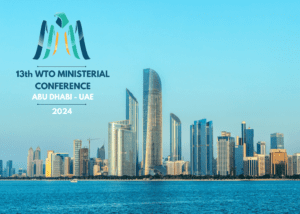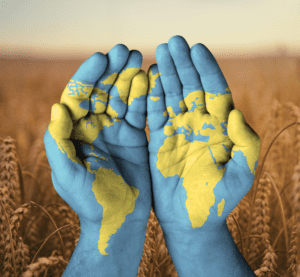|
Next Tuesday, February 27 and Thursday, February 29, WITA will host Zoom briefings live from the WTO MC13 in Abu Dhabi. Information can be found below, or click on the links above. The World Trade Organization (WTO) will hold its 13th Ministerial Conference (MC13) in Abu Dhabi from 26 to 29 February 2024. Priority items on the MC13 agenda are likely to include the reform of the WTO’s dispute settlement function; new disciplines to eliminate fisheries subsidies that encourage overfishing and overcapacity, to complement the multilateral Agreement on Fisheries Subsidies adopted at MC12 in June 2022 and currently under ratification; the integration of the plurilateral Investment Facilitation Agreement into the WTO legal architecture; and the extension of the e-commerce moratorium. WTO members are set to endorse formally the WTO accession of Comoros and Timor-Leste, increasing the organisation’s membership to 166. Restoring a fully and properly functioning WTO dispute settlement system Since December 2019, the Appellate Body – the second instance of the WTO’s dispute settlement body– has been paralysed, after the United States (US) repeatedly blocked the nomination of new judges to review appeals of first-instance panel reports. In line with the MC12 mandate to restore a functioning dispute settlement system by 2024, WTO members have held informal negotiations on two separate tracks: one that has led to a draft consolidated text on issues other than the appeal mechanism, and another for the debate on the appeal mechanism that as of January 2024 was still focused on ‘the identification of certain concepts that could offer a solution to this critical issue’. Speaking for the Appellate Body’s main critics, US Trade Representative Katherine Tai, at the G20 Summit in India in August 2023, stated that the ongoing new and constructive process of reforming the WTO’s dispute settlement function ‘requires a fundamental rethink’ with a view to ending ‘the practice of judicial rule making’, among other things. She emphasised that the US had tabled 30 ideas, including on the appeal mechanism. At a US think-tank event in September 2023, she specified key points of the US position, e.g. the need for appropriate alternatives to litigation (leading by example, the US recently resolved all its trade disputes with India through methods other than litigation), an end to ‘judicial overreach’, for WTO members’ policy space to be restored, to allow them to regulate on climate-change issues and non-market practices, and for members to remain free in their legitimate national-security judgements. Some commentators do not expect a breakthrough at MC13, since the 2024 deadline coincides with the US presidential election year, in which repairing a system that in the US is perceived by both Democrats and Republicans as having allowed the ‘China shock’ that eliminated millions of US jobs would politically be very challenging for the Biden administration. |
|
02/06/2024 | Gisela Grieger | European Parliamentary Research Service
|
WTO’s 13th Ministerial: Any Good News for LDCs?As the 13th Ministerial Conference (MC13) of the World Trade Organization (WTO) is set to start next week in Abu Dhabi, United Arab Emirates (UAE), Least Developed Countries (LDCs) are struggling hard to secure their trade benefits in the multilateral forum. Currently, 35 members (including Bangladesh) of the WTO are LDCs, as per the United Nations benchmarks, and formed the LDC Group in the organisation. As the group’s coordinator, the African country Djibouti, submitted the draft LDC ministerial declaration in the second week of January. The draft declaration contains two sets of priorities: one is LDC-specific, and the other is general. The LDC-specific priorities are placed in four key areas: (a) agriculture and food security, (b) fisheries subsidies, (c) decisions on graduation, and (d) paragraph 8 of the MC12 outcome document. Of these, LDC graduation is the most critical, especially for the LDCs already on the path to coming out of the category within three to five years. Bangladesh, along with Nepal and the Lao People’s Democratic Republic, will formally come out from the UN-defined category by the end of 2026. More LDCs will follow these countries. There are 45 LDCs, of which 15 are now on the path to graduation, and 10 are WTO members. Last December, Bhutan came out from the list. In the document placed for MC13, LDCs categorically emphasised ‘the need for fresh support measures by the development partners targeted to LDCs after graduation to ensure smooth and sustainable transition.’ Five months ago, in October last, the General Council meeting of the WTO decided to encourage members of the organisations to provide a smooth and sustainable transition period for the graduated LDCs before withdrawing the unilateral tariff or duty-free and quota-free (DFQF) market access to these countries have been enjoying as LDCs. The decision becomes a big boost to the LDCs, although it is not binding. It is also unlikely that the scheduled ministerial conference will make it binding instead of keeping it voluntary or ‘best endeavour’ for the member countries. In that case, a continuation of the benefits for the LDCs after graduation will entirely depend on the willingness of the market access-providing countries. In other words, LDCs have to negotiate separately or bilaterally to enjoy the benefit for an extended period. |
|
13th WTO Ministerial Conference: What is at Stake for Digital Trade? |
Following are excerpts from the blog post “13th WTO Ministerial Conference: What is at Stake for Digital Trade?” by Marília Maciel at Diplo.
In Abu Dhabi, members will discuss the continuation of discussions taking place under the Work Programme on e-commerce, and will decide on the future of the current Moratorium on Customs Duties on Electronic Transmissions. The Work Programme, launched in 1998, involves all WTO members, and aims to build understanding around the trade-related aspects of e-commerce, including the relation between e-commerce and existing WTO agreements, and its interplay with development. The Moratorium was also introduced in 1998, and exempts digital products, such as online films, music, and software from tariffs (customs duties) as they cross borders. The Moratorium has been extended roughly every two years by consensus, and the current extension will expire at MC13.
The continuation of the Work Programme could be relatively straightforward, especially considering the 2022 Ministerial decision to reinvigorate the Work Programme, and the concrete efforts made to ensure that the discussions emphasize the development dimension. However, the issue may become embroiled in the controversy surrounding the extension of the Moratorium. While some countries hope to make the moratorium permanent, others are increasingly putting its renewal into question. A vocal group of developing countries – including India, South Africa and Indonesia, among others, claims that the Moratorium is depriving developing countries of much needed revenue, citing a study that supports this position. This revenue loss could be even more significant in the future, as digitalization continues, and new technologies, such as 3D printing, develop.
…The outcomes from MC13 are not going to significantly change the e-commerce landscape. The non-renewal of the moratorium would carry an important symbolic weight, and could be a setback against the WTO’s primary goal to remove tariff barriers to trade, contributing to sapping trust in the Organization. Nevertheless, even if the Moratorium is not renewed, many countries have already committed to a moratorium on customs duties in the context of free trade agreements that they celebrated – according to the OECD 95% of digital trade chapters include such provision. Moreover, if a moratorium is agreed in the JI, at least 90 countries would abide by it at the WTO. The end of the moratorium would certainly create policy space for the countries which have not committed to the non-introduction of customs duties, but it is not clear whether and how they would make use of such space.
One of the collateral consequences of MC13 could be, therefore, to highlight once more the key importance of FTAs for the legal architecture of global digital trade. In particular, FTAs could be seen as the way to “get things done” if the opposition to JIs manages to deter the incorporation of outcomes from joint initiatives into the WTO legal architecture. This could consolidate the growing perception that the most dynamic aspects of the digital economy need to be taken elsewhere and discussed separately, notably in Digital Economy Agreements (DEAs). The WTO continues to be a custodian of the baseline agreements that serve as pillars to the global trading system. However, advancements are taking place outside the WTO framework, at different speeds and geometries, enhancing the complex tapestry of trade policy and regulation.
|
|
|
Electronic commerce has been one of the very few areas of trade law in which one can observe a willingness shared by the international community to move forward and actively engage in new rule-making. This is reflected in the current World Trade Organization (WTO) Joint Initiative on Electronic Commerce, which aims at concluding a plurilateral agreement on this topic. The Article contextualizes and explores these developments by looking at the relevant digital trade provisions in preferential trade agreements (PTAs). It does so by highlighting the legal innovation in the most advanced templates of the Comprehensive and Progressive Agreement for Trans-Pacific Partnership (CPTPP) and the United States-Mexico-Canada Agreement (USMCA), as well as those in dedicated digital economy agreements, such as the ones between the United States and Japan, and among Chile, New Zealand, and Singapore. The Article also covers the newer EU trade deals and looks at the Regional Comprehensive Economic Partnership (RCEP), the first agreement with digital trade provisions that includes China, to give a sense of the dynamic governance environment on issues of digital trade. The Article compares the PTA rule-frameworks with the WTO negotiations on electronic commerce and seeks to identify points of convergence and divergence reflected in the latest negotiation proposals tabled by WTO Members. The analytical focus here is placed on the legal substance of the future WTO deal and its viability to adequately address the practical reality of the data-driven economy. INTRODUCTION “Electronic commerce” or “digital trade,” as it is now more frequently referred to, is a topic that has steadily moved up on the priority list of trade negotiators. On the one hand, this interest has to do with the advanced digitization and the critical importance of data to global economies; on the other hand, it can be linked to the multiple new issues that the data-driven economy has raised, such as those in the areas of personal data protection or national security, which demand urgent regulatory responses. The multilateral forum of the World Trade Organization (WTO), despite its long-acknowledged stalemate, together with its troubles to move forward with the Doha negotiation round and to secure a working dispute settlement mechanism, has also become active on the topic. There seems to be a broad agreement among the WTO Members that it is high time to finalize an agreement on electronic commerce that can address many of the so far unresolved issues of digital trade in the body of the WTO Agreements, provide a platform for cooperation, and ensure legal certainty and equity. This Article follows and contextualizes this development and seeks to address critical questions as to the form and substance of the new WTO treaty on electronic commerce.
|
|
|
|





